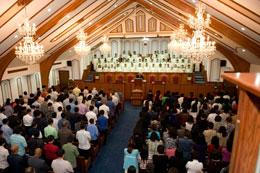Pastor fleeing church granted refuge in BC

The pastor of a politically influential, wealthy and secretive Christian church in the Philippines
With global links has been granted refugee status in Canada after he claimed that he was targeted for murder.
The Immigration and Refugee Board found that the church "is motivated by a vendetta" against the dissident pastor, Lowell Menorca II, who sought refugee status in B.C., has "both the means and the motivation to seriously harm or kill" him.
He's "a person in need of protection from a risk of cruel and unusual treatment or punishment and a risk to his life," the ruling said, according to a statement obtained by the CBC.
"I was ecstatic. I was overcome with joy," Menorca told CBC of the IRB's findings.
"I cried and I cried, and thanked God that finally this was the vindication I was praying for."
The Filipino Post reported in 2016 that Menorca had sought refugee status in Vancouver claiming he is being targeted for murder.
Menorca II, who was expelled from the Iglesia Ni Cristo (INC) said via a letter released to the media that he was in Vancouver pleading his case before Canada’s Immigration Refugee Board.
The application for special entry lists himself, his then pregnant wife Jinky, 2-year-old daughter Yuri Keiko, sister-in-law Jungko Otsuka, brother Anthony Menorca and his wife Shayne, and their house help Abegail Yanson.
The family fled Manila about two years ago, staying in Vietnam for two weeks before moving on to another country, citing threats to their lives.
“We confirmed reports the people who were responsible for our kidnapping and illegal detention are out of the country and actively searching for my family to use them against me,” Menorca said in a six-page letter.
“They have mobilized local resources in Vietnam, Thailand, Vancouver and even Southern California to look for me and my family,” he said.
He attached to his letter screengrabs of supposed Facebook posts by INC members taunting the family with their photos at airports in Vietnam and Thailand to prove they were being tailed.
Menorca’s plea for refugee status came after the Court of Appeals in Manila threw out the family’s bid for court protection, as the case was rendered moot by the family’s departure from the Philippines.
The Menorca family initiated court proceedings against their former church after the INC allegedly detained them for three months at its Central Office in Quezon City.
Menorca was among 10 INC workers and ministers abducted after being suspected of being behind online exposes of corruption in the upper echelons of the politically influential sect. Some members of the sect’s founding family—the Manalos—were also isolated.
After Menorca filed abduction charges and sought protection against the INC, he was slapped with several counter cases, including three libel suits and an adultery complaint—charges Menorca said were part of the INC’s efforts to harass him.
In his letter, Menorca detailed his family’s ordeal, appealing to the Canadian government to grant him and his loved ones a new beginning.
“I am just one man standing for the truth and what is right against a very, very powerful institution which uses the church as a façade for its illegal activities and human rights abuses. I am no match for them,” said Menorca.
He described the INC as an institution that has a stranglehold on the Philippine government, saying authorities have been unable to do anything against the church’s wishes.
“We are all being targeted ‘to be silenced’ by the INC and by extension, our own government, which INC is able to manipulate,” said Menorca.
“This is why we are begging your good government to grant us refuge. We are in dire need of protection from a government such as yours which cannot be bribed or influenced by INC, whose law enforcement is faithful to its duty to protect and serve its citizens and not be used as an instrument to oppress and suppress by the influential and corrupt,” he told the Canadians.
Before he fled the country, Menorca issued a statement in Filipino saying he feared for his life, having received death threats, even one against his youngest child, from suspected members of the INC.
He retold how he was abducted by armed men—including some he identified as Quezon City policemen—from his small church in Butag, Sorsogon, on July 16, 2015, jailed in Dasmariñas, Cavite, on trumped up charges, allegedly with the help of a city prosecutor in that town. He said he was released after nine days in the Dasmariñas jail and turned over by the police chief to INC leaders, who then detained them at the local church’s Quezon City compound for three months, before he was rescued by the National Bureau of Investigation. However, his nightmare has not ended as he faces threats of arrest for various cases filed by the powerful group.
The Iglesia ni Cristo (INC or Church of Christ), with congregations across Canada and billions in assets worldwide is known for its unity and its members voting in a block.
The Philippine-based church was founded in 1914 by Felix Manalo. Born out of his dissatisfaction with the Catholic Church. Manalo is viewed by his followers as God’s last messenger. They believe there is no salvation outside the INC. Within a century, the church has grown to three million members worldwide who support the church through generous donations. The largest congregation outside of the Philippines is in the United States. In Canada, the church has congregations from British Columbia to Quebec.
The INC wields much influence within its overseas congregations as well in its homeland, where Philippine politicians seek its endorsement during elections. The INC gets its power not from sheer numbers but from the legendary unity of its flock. The faithful gather for religious services twice a week and pay regular tithes across 101 Philippine ecclesiastical districts, each with 15 to 70 locales, and 27 more districts across the United States, Canada, Europe, Africa, Asia and Australia.









